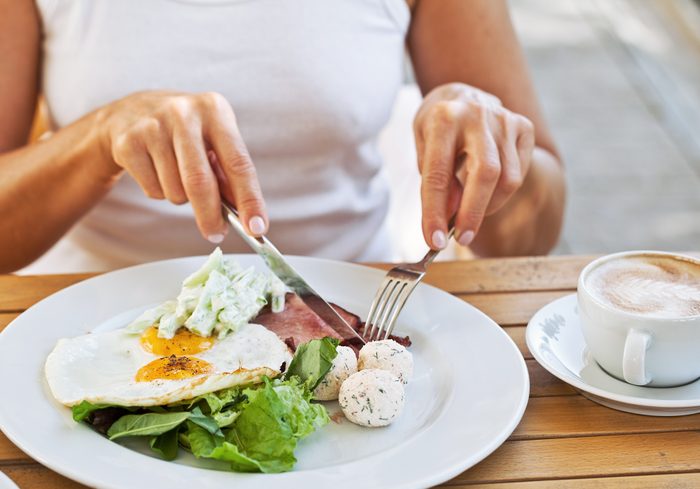What Is Intuitive Eating?

Vincci Tsui, a Calgary-based certified intuitive eating counsellor, breaks down the “anti-diet diet.”
Since eating disorder clinicians Evelyn Tribole and Elyse Resch published their groundbreaking book Intuitive Eating: A Revolutionary Anti-Diet Approach 25 years ago, the “anti-diet diet” has grown in popularity. Now, counsellors around the world are certified in the approach, guiding their clients through the ten principles of intuitive eating to, among other foundations, reject the diet mentality, make peace with food and respect their bodies.
We spoke with Vincci Tsui, a Calgary-based anti-diet dietitian and certified intuitive eating counsellor, all about the approach.
(Related: How the Pandemic Helped Me Embrace Weight Gain and Intuitive Eating)
What is intuitive eating?
It’s a term that was coined by [Tribole and Resch] back in 1995. The idea behind it is really a self-care approach to food. It’s about getting people attuned to their inner wisdom and intuition when it comes to making choices around food. Evelyn and Elyse were both eating-disorder clinicians, and they found that their clients relied on external rules to eat. Intuitive eating isn’t necessarily about getting rid of all those rules, but it starts putting in some of your internal wisdom when it comes to making food decisions, so you’re not bound by external rules all the time.
(Related: How Can I Make Sure My Kid Has a Healthy Relationship With Food?)
What sets intuitive eating apart from a diet?
It isn’t a set of guidelines as to what or how much you’re supposed to be eating. Some people frame it as a change of mindset around food: It’s about getting people attuned to their inner wisdom when it comes to making choices around food. One person eating intuitively could look completely different from someone else who is also eating intuitively.
The problem with some of the diets out there is that it makes an assumption about you, or it only considers certain factors around food like calorie count. The reality is that food and our bodies and our experiences are just so much more complex than that.
Who do you work with?
The way I tend to work is go back to the core issue. Instead of saying, “Here’s intuitive eating and how to do it,” I ask: What are you looking for? What made you seek out a dietician? What made you want to try intuitive eating? And I work from there. For a lot of folks, just coming up against some of the rules they have around food, questioning their rules, and pushing the limits works almost in an exposure-therapy kind of way to reintroduce foods back to people’s eating patterns.
I do see a lot of people who struggle with disordered eating. When they’re following someone else’s rules around eating, people with eating disorders lose that connection to what they themselves truly need. For some people, it’s about starting to figure out what they need and what satisfies them when it comes to food, and that allows them to seek out what they truly need in other areas in their life as well.
I also work with a lot of folks who might have read the book or listened to podcasts and want to know how intuitive eating could fit in their life. Having individual support to make the principles fit is important. That’s the main job of a counsellor.
(Related: How the Pandemic Finally Made Me Confront My Eating Disorder)
Does intuitive eating for work everyone?
I honestly think that the vast majority of people are able to integrate some of the principles of intuitive eating within what they’re doing. It is possible to just integrate one or two of the principles, like rejecting diet culture—I think everyone can integrate that. You can also do things that would be considered intuitive eating but not have to call it intuitive eating. I think sometimes we want to have labels on what we’re doing, and you really don’t have to.
Some of my clients feel that they’re doing intuitive eating “wrong,” or that intuitive eating is not for them, just because we only see like one version of intuitive eating that’s popularized that doesn’t take into account people with chronic conditions or allergies or food restrictions or food insecurity. I think the most important thing is eating in a way that makes people feel good.
Next, Meet 7 Canadian Body-Acceptance Influencers to Follow Now




